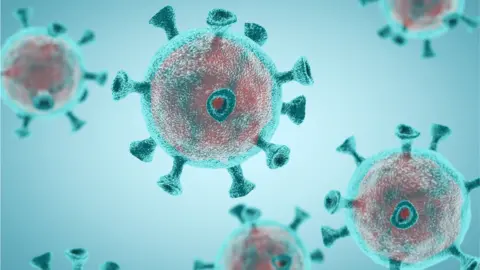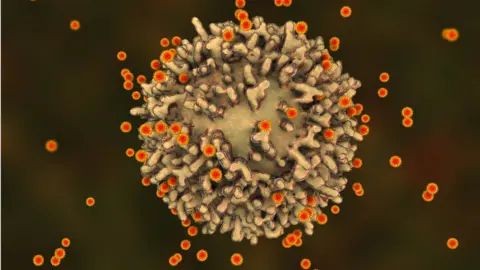T-cell response 'lasts six months after Covid infection'
 Getty Images
Getty ImagesScientists have found evidence of immune cells responding to Covid-19 six months after people were infected.
In a study of 100 people with the virus, those with symptoms had a much higher T-cell reaction.
But it is still not clear whether this leads to better protection against re-infection.
The UK research team says the findings are "just one piece of the puzzle" on immunity and there is still a lot to learn.
The key question is whether being infected once with coronavirus can protect the body against being infected again and, if so, how long this immunity could last.
Scientists know that antibodies are made by the body from around 10 days after infection, but appear to dwindle over time. They stick to the virus in order to stop it.
They have also discovered that a kind of immune cell, called a T-cell, attacks the cells infected with the virus. This is known as the cellular immune response and could also be key.
This study, which has not yet been peer-reviewed or published in a journal, suggests T-cells could play the more important role.
The research was carried out by the UK Coronavirus Immunology Consortium, involving the University of Birmingham, the NIHR Manchester clinical research facility and Public Health England.
 Getty Images
Getty Images"Early results show that T-cell responses may outlast the initial antibody response, which could have a significant impact on Covid vaccine development and immunity research," said Dr Shamez Ladhani, study author and consultant epidemiologist at Public Health England.
Prof Paul Moss, from the University of Birmingham, said the study was the first in the world "to show robust cellular immunity remains at six months after infection".
This was based on samples taken from 23 male and 77 female healthcare workers who had been infected with coronavirus in March or April, and had either mild to moderate symptoms or were asymptomatic. None of them were ill enough to be admitted to hospital with Covid-19.
The researchers say it is possible that a good T-cell response might provide people who had symptoms with more protection against being infected again.
But it could also be that asymptomatic people are simply able to fight off the virus without needing to build up a large immune response.
They said it was important to check for a T-cell response in trials of vaccines.
"We now need more research to find out if symptomatic individuals are better protected against re-infection in the future," Prof Moss said.
Prof Arne Akbar, president of the British Society for Immunology, called the study "a step forward in our understanding of immunity against SARS-CoV-2".
"By analysing the contribution of T-cells to immunity after infection, we are moving closer to discerning a clearer picture of the complex question of individual protection after infection," he said.